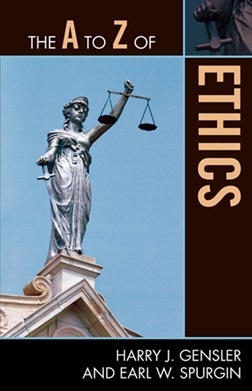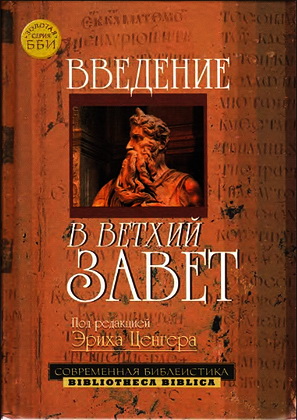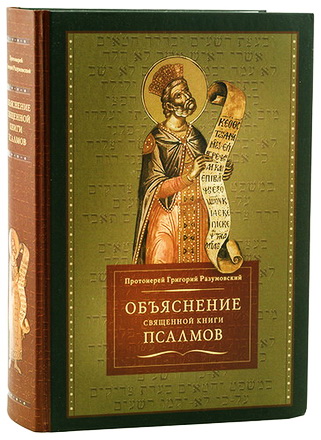
Gensler - Spurgin - A to Z of Ethics - модуль BibleQuote
Harry J. Gensler, Earl W. Spurgin - A to Z of Ethics
Lanham, MD: The Rowman & Littlefield Publishing Group, Inc., 2008. – 426 p.
ISBN 978-0-8108-7588-3 (pbk. : alk. paper)
Of all the branches of philosophy, the one that ordinary people hear the most about is ethics. That is also the one that masses of men and women, including experts in other areas, think they know the most about. That is usually a mistake since ethics in many ways is harder to pin down and comprehend than logic, aesthetics, or even metaphysics. Worse, a person’s own view of ethics tends to blot out countless alternative views, leaving many of them poorly understood or utterly ignored. This should make the latest addition to the philosophies sub-series particularly welcome, if only people would admit their limits and find out more about the subject, which is hopefully the case. This volume provides, among other things, information about major ethical issues, significant schools of thought, outstanding philosophers, and basic terminology. It does so not by pontificating or deciding for the reader what is right and wrong but by showing the range of alternatives proposed by various experts. Also, and this is a big plus, while rooted in the “Western” study of ethics it also includes the insight and wisdom of other cultures, including Buddhism, Daoism, Hinduism, Islam, and Judaism.
This Historical Dictionary of Ethics, like other volumes in the series—some of which should serve as excellent partners with it—starts with a chronology, showing just how far back the roots of ethics lie and tracing its evolution and expansion to the present day. The introduction demonstrates why ethics is so important, why it has attracted some of the greatest minds, and how it has affected generation after generation despite the fact that many once unquestionable ideas have since become disputed or cast aside. Just how up-to-date it is should be evident from the issues dealt with in the dictionary section, including some at the top of the contemporary agenda, ranging alphabetically from abortion to capital punishment, euthanasia, happiness, homosexuality, justice, racism, privacy, sexism, terrorism, and war. It also includes entries on philosophers, such as Aristotle and Mary Wollstonecraft, that cover a wide range of periods and approaches in the history of ethics. The bibliography, not usually the most important section, certainly is worthy of attention since this book can be only a first step toward a better understanding of ethics while the many titles it lists can take readers further and further.
This book was written by Harry J. Gensler and Earl W. Spurgin, both professors of philosophy at John Carroll University in Cleveland, Ohio. Dr. Gensler is interested in logic and ethics and may be familiar to readers as the author of the recently published Historical Dictionary of Logic. This is hardly his first book on ethics, since he has already written Formal Ethics and Ethics: A Contemporary Introduction as well as many articles and papers. Dr. Spurgin, besides his work in philosophy, is director of the university core curriculum. His interest in ethics revolves around, among other things, business ethics, which is a newish but rapidly advancing field, it having previously been assumed that business and ethics somehow did not go together. This expands their circle of interests and their combined knowledge; and their need to explain ethics to students and business persons enhances their ability to communicate what often seem, until examined closely, to be deceptively simple concepts.
* * *
ETHICS OF BELIEF
The study of moral responsibilities about beliefs. William Clifford (1845–1879), in his essay “The Ethics of Belief,” defended this exceptionless principle: “It is wrong always, everywhere, and for anyone, to believe anything upon insufficient evidence.” He wrote of a ship owner who, without proper investigation, talked himself into believing that his ship was trustworthy; the ship sank, killing all the passengers. Even if the ship had not sunk, the owner still would have been irresponsible and blameworthy. Believing on weak evidence is always harmful, since it ruins our intellectual character and this will have bad consequences later.
William James (1842–1910) criticized Clifford’s principle, which he took to mean “It is wrong to accept what is not proved.” James objected that the view is inconsistent in two ways. First, the view is itself not proved; so it would be wrong on its own standard to accept it. Second, Clifford’s principle is inconsistent with our practice; in daily life we all, including Clifford, have beliefs based on hunches rather than proof, and such beliefs do not have such dire consequences as Clifford claims. We follow our hunches about political candidates, moral issues, whom to marry, and which scientific hypothesis is most promising; it would paralyze us if we always had to wait for proof on such matters. In personal relations, we believe good things about others until these are proved otherwise. In disaster situations, we believe without proof that we will survive, and this belief may be the force that brings about our survival and thus makes itself true; forbidding such beliefs would be absurd.
James also claims that Clifford’s principle is unbalanced. James thinks truth seekers have two duties: to believe truths and to avoid believing falsehoods. Clifford’s principle puts all the weight on the second, on avoiding error; but this would make us lose many truths. We ought, instead, to steer between the vices of being too gullible and being too skeptical. James thought that where proofs exist they ought to be accepted; but on important issues that we cannot decide on intellectual grounds, we often must, and rightfully may, follow our feelings.




Комментарии
Пока нет комментариев. Будьте первым!